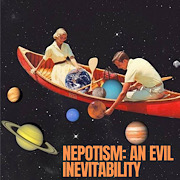|
feedmegin posted:Hey don't forget France and the UK holding butter knives saying 'come at me and I'll give you such a nasty cut on the wrist before you chop my head off!' The neat thing about MAD, NATO and the Warsaw Pact was that it didn't matter. England, for example, would have triggered exactly the same quantity of universal destruction with their tiny arsenal then America's trillion dollar projects, in fact, the more Americans and Soviets spent on weapons, the more powerful England's arsenal got. Why, they could have destroyed all human beings with a mere handful to America's thousands: talk about efficiency!
|
|
|
|

|
| # ? May 3, 2024 03:18 |
|
HoratioRash posted:At that point, USSR also started to recognize that they dont really need a second GDR in their backyard, and so they flooded the country with thousands their own specialists. This was just an off the cuff comment but it grabbed at me. Can you explain this further about the GDR because I don't get it?
|
|
|
|
Rhymenoserous posted:It's worse, once the Nimby crowd understands that we want to send a nuclear rocket up even on conventional thrust expect videos of challenger to abound and people saying "Just launching them is too dangerous". Yeah I was gonna say "they will need to be built in orbit" but that makes me too pessimistic for the future because that's probably beyond my lifetime. There's no way to get enough fissile material up there without people's panties getting in a bunch (and to some degree I don't blame them, but I want us exploring the solar system damnit!)
|
|
|
|
This isn't really a cold war question, but something that's been bugging me is how did private ownership work in the Soviet Union? Like, if you wanted a car did you put in a requisition form and 8-12 months later you maybe got a car, or did you actually have some kind of state owned dealership where you could buy your people's car?CoolCab posted:The neat thing about MAD, NATO and the Warsaw Pact was that it didn't matter. England, for example, would have triggered exactly the same quantity of universal destruction with their tiny arsenal then America's trillion dollar projects, in fact, the more Americans and Soviets spent on weapons, the more powerful England's arsenal got. Why, they could have destroyed all human beings with a mere handful to America's thousands: talk about efficiency!  God save the queen God save the queen 
|
|
|
|
I think most people just didn't have cars.
|
|
|
|
Don Gato posted:This isn't really a cold war question, but something that's been bugging me is how did private ownership work in the Soviet Union? Like, if you wanted a car did you put in a requisition form and 8-12 months later you maybe got a car, or did you actually have some kind of state owned dealership where you could buy your people's car? I think it was more like the former, only instead of a car it was an apartment and instead of 8-12 months it was 8-12 years.
|
|
|
|
Don Gato posted:This isn't really a cold war question, but something that's been bugging me is how did private ownership work in the Soviet Union? Like, if you wanted a car did you put in a requisition form and 8-12 months later you maybe got a car, or did you actually have some kind of state owned dealership where you could buy your people's car? I think it was a combination, IE you had to save up X monopoly dollars to get a car/house, and there was also a 5 year waiting list before it was available. The USSR definitely had money and salaries
|
|
|
|
My understanding is that Soviet money was, in practical terms, more like a ration card or food stamps than like market currency. So if the official salary is X, the central planners fix the price of food to an amount that makes workers spend just the right percentage of X on food. There were also only certain things that could be bought and sold (and the check against trading on the black market was that nice Mr. Ivanovich from the KGB would ship you to Siberia if you tried).
|
|
|
|
Money was money. If you had it, and things you wanted were on sale, you could buy them. You couldn't (legally) buy foreign, convertible currency, but it did have value. What was banned was "speculation", buying low and selling high, which in the light of subsidies and shortages sorta made a bit of sense. That included imported items though. If you ask me, it was even overvalued, as most consumer goods, particularly food, were heavily subsidized. Particularly bread, whose price was an important political talking point -- I remember the cheapest loaf of bread cost 0.12 roubles for a good sized loaf and thus country folk bought sackfuls of it to feed to pigs and sheep, as regular animal feed was more expensive. Stuff that wasn't subsidized, like cars for example, were quite expensive though. The average salary was 200-300 roubles/mo during 80ies; a Lada cost 8,000, a Volga cost 12,000+, even the cheapest ZAZ (Fiat 600 clone) was several thousand. It took a helluva lot of saving to afford a car. I think in the 60s-70s you needed a car buying permit to buy a car even if you had the money; in the 80ies they were also starting to be sold on "free" market. Basically, money was valuable, but people didn't earn a lot of it; to make up for that, prices for most consumer goods were fixed and heavily subsidized. Stuff that wasn't subsidized, like cars or electronics, were thus quite expensive.
|
|
|
|
How did the economy of the Soviet Union work/not work? I mean in school we learned that it was a planned economy led by a horrible dictatorship, which lead to widespread misery for the common citizen but was this the only reason their situation was so bad? I'm interested in how it worked in practice and what sort of constraints they had to deal with.
|
|
|
|
A big part of it was them trying to compete with the much richer US as world leader all the time and dedicating lots of their industry and economy to that. And I believe the brass of the soviets liked heavy industry over light industry like would be used to produce consumer goods.
|
|
|
|
scissorman posted:How did the economy of the Soviet Union work/not work? A huge share of the economy went into military spending and propping up Communist allies like Cuba and Angola. From the memoirs of people who were involved with the central planning, the system actually worked fairly well considering, and there were a lot of bright minds behind it. Main problem was that only a small fraction of the economic output proceeded to benefit the common citizen. The living standards were never anywhere near the West, even the welfare-living West, but it needs to be said that it only got really bad in Gorbachov's time. When market was partially liberated and some companies and plants could sell their produce at market prices, while many others had to sell their stuff with the old, fixed prices. When, say the baker had to keep selling his bread for the old 0.12, while the miller could sell his flour at market price and ask 10x as much as before, that's when poo poo really hit the fan. There was hyperinflation, running many industries became completely pointless, poo poo went bankrupt and got bought up by the oligarchs for pennies, stores got completely cleaned up of goods, etc.
|
|
|
|
Radio Talmudist posted:What was the reaction of Soviet elites (and also Soviet citizens) to the chilling of Sino-USSR relations and Nixon/Kissinger's overtures to China? I know I'm not answering your question, but the best (only?) collection of Soviet insider information is at http://bukovsky-archives.net/, collected right after the fall of communism, before the doors were slammed shut again for 30 years and most likely much longer than that. Unfortunately only a tiny fraction of those documents have been translated into English. scissorman posted:How did the economy of the Soviet Union work/not work? Wow! That topic is a mind-boggling giant of an enigma. You're best of reading books about this subject. But I won't recommend any books lest I appear biased. However, anyone trying to exonerate the communist economy is either lying, delusional, completely ignorant or is pushing an agenda. The best example of complete soviet incompetence comes from Politburo deliberations during the Polish crisis, 1980-1981, which are a translated set of documents from the archive I mentioned above. To summarize, Polish comrades, being communists only 35 years at that point, had been too accustomed to eating meat in order to forget it so easily, and started to get uppity. In order to get them to shut up, the Soviet top leadership decided to assist Poland with 30 thousand tons of meat. It may seem like a lot at first glace, however, the US produces 35,000 thousand tons of meat per year. The Politburo meets again and again to follow up on the progress collecting that amount. All Soviet republics and regions are reporting the five-year plan for meat has been exceeded, but they still can't requisition the required amount. Finally, they shipped just half of what was planned, and here I'll quote straight from the Politburo minutes: "[The] meat, is being delivered in dirty, unsanitary freight cars normally used to transport iron ore, making for an unpleasant sight. [...] Poles have been expressing highly obscene comments about the Soviet Union and the Soviet people, they've refused to clean out the freight cars, etc. One could not even begin to keep count of all the insults that have been directed against us." And that's when the Soviet leadership realized that things couldn't keep on going as they have been for too much longer. Horns of Hattin fucked around with this message at 20:58 on Oct 10, 2014 |
|
|
|
The planned economy didn't work, and couldn't work without supercomputers significantly more powerful than we have even today. It's a blog, but this is a good overview of the computational resources required to make such a system work: http://crookedtimber.org/2012/05/30/in-soviet-union-optimization-problem-solves-you
|
|
|
|
Part of the reason the planned economy didn't work in the Soviet case was that the system relied on a fair bit of dis-ingenuousness, corruption, and incentive to over report production. When the 5 year plans or whatever were initiated, the orders would be relayed down to the Republics and other regions to fulfill various quotas. These quotas were expected to be met, and if they weren't, political leaders would be punished by either being moved to less favorable positions or being denied promotion. So what did most of them do? They lied, and said production was up. The central government knew what was going on, because most of them had done the same to get into their higher position, and they knew the system. So they pretended to believe it, declared production was up, set the prices accordingly (with big subsidies, in the case of staple goods, as already outlined). Come market day - there's a shortage, because, unsurprisingly, they didn't make enough of the product. Repeat ad naseum. Combine all this with corruption and the black market siphoning of what little production there was, and you've got a really broken system. Those who successfully lied, or at least kept things under control back home, were promoted. Many of the future leaders of the various breakaway Republics in the Caucasus/Central Asia were communist party leaders who made their careers doing this. JosefStalinator fucked around with this message at 10:49 on Oct 11, 2014 |
|
|
|
|
I guy I knew from Poland told me that they used vodka as a kind of second currency for grey market trades  . After the wall came down, they had guys from their village crossing the border and coming back with their pickups full of Coca Cola and stuff. . After the wall came down, they had guys from their village crossing the border and coming back with their pickups full of Coca Cola and stuff.CoolCab posted:The neat thing about MAD, NATO and the Warsaw Pact was that it didn't matter. England, for example, would have triggered exactly the same quantity of universal destruction with their tiny arsenal then America's trillion dollar projects, in fact, the more Americans and Soviets spent on weapons, the more powerful England's arsenal got. Why, they could have destroyed all human beings with a mere handful to America's thousands: talk about efficiency! That was something I never got about the absurd arsenals of the US and USSR. What's the point of thousands of nukes, when a hundred or two will wipe out all your enemies' major cities anyway? I'm guessing it's just a dick measuring contest, or am I massively overestimating the damage a nuclear exchange would do? Similarly the idea of who'd win after a nuclear apocalypse. What on earth is the point of carrying on fighting for America after most of its population centres are smoking ruins? How would you even convince/force people to enlist, industries to continue, etc? They'd just split off into little fiefdoms and hope to survive. Your infrastructure is ruined and your country consists of some guys in a bunker, what's left of the armed forces trying to hold things together at home while fighting World War 3, and rural areas covered in fallout...
|
|
|
|
Strategic Tea posted:I guy I knew from Poland told me that they used vodka as a kind of second currency for grey market trades The ussr had pretty bad accuracy on a lot of their weapons which lead to them just building an assload in a sort of quantity over quality situation. Even in the us we assumed that some fraction of our missiles/bombs would fail before they got to their targets and we doubled up accordingly. Once the two sides realized the other side was stockpiling weapons, they then had a reason to stockpile more of their own, which lead to massive stockpiles being created in a kind of vicious cycle. The whole point was deterrence. The USSR built them because we had them and that threatened the Russians. Then we built more to make sure they were too scared of striking first, and the cycle just went on and on for decades. I mean sure the generals talked about winning WWIII but everyone else knew it was all about MAD. And that's probably the only reason the button never got pushed (yet).
|
|
|
|
Strategic Tea posted:That was something I never got about the absurd arsenals of the US and USSR. What's the point of thousands of nukes, when a hundred or two will wipe out all your enemies' major cities anyway? I'm guessing it's just a dick measuring contest, or am I massively overestimating the damage a nuclear exchange would do? You are in fact underestimating the amount of damage a nuclear exchange would do! Don't think of the immediate effect of bombs detonating, or even the radioactive fallout. Think about the umteen billion tons of (radioactive) dirt and smoke that will suddenly fill our atmosphere. As the theory goes (and we see a smaller version of it in Hiroshima and after testing) the sky goes dark for a period of months, all crops fail, the temperature plummets and whoever is misfortune enough not to be converted into free radicals instantly and survive radiation poisoning starves and/or freezes to death. That's the "nuclear winter" you may have heard tossed about. We do not put "assured" in "Mutually Assured Destruction" for nothing: everyone dies, paupers and princes, communists and capitalists alike. Now, imagine a scenario where one side has enough bombs that they can surgically strike all of the other sides's launching points. It's not "mutually" assured anymore. World war 3, everyone dies. So both sides require a second strike capability: enough ICBMs that even after taking a direct nuclear strike they can still Assure the Destruction Mutually.
|
|
|
|
The Soviets put a lot of focus on "Second Strike" capability - basically, after the ICBMs destroy "hard" targets (ICBM silos, major military installations), a huge portion of the balance of power will rest on who still has nuclear weapons. This way, you could survive a cataclysmic first strike without being forced to submit to the other guy. This mostly took the form of massive ballistic missile submarines, such as the Typhoon. The Soviet Navy would have put the vast majority of their resources into protecting them if war broke out. The American government didn't understand this until the late 70s, when we finally began adjusting our overall strategy to be in line with it. It was a tremendously delicate balance - the US never foreswore "first strike", and the Soviets favored an incremental approach (such as a willingness to use tactical nuclear weapons in Europe). This is a big part of why tactical nukes/missiles are so heavily controlled. While their actual destructive power isn't as much as it could be, they represent a very destabilizing force. It's worth noting that the U.S. Navy pioneered this Second Strike thing. It was the brain child of the Chief of Naval Operations from 1955-1961, Arleigh Burke. It isn't unfair to say that he alone helped pull the world back from the brink of an apocalyptic nuclear exchange. Eisenhower had a "use it or lose it" nuclear arsenal at his command until Burke offered him Second Strike through ballistic missile submarines. The Soviets saw the wisdom of this and pressed ahead on their own "boomer" program, setting the stage for the nuclear balance we see today.
|
|
|
|
icantfindaname posted:The planned economy didn't work, and couldn't work without supercomputers significantly more powerful than we have even today. It's a blog, but this is a good overview of the computational resources required to make such a system work: Sadly I can't access the site; could someone else try and see if it works for them?
|
|
|
|
scissorman posted:Sadly I can't access the site; could someone else try and see if it works for them? Works ok for me. Here's the google cache of it, see if that works.
|
|
|
|
MRC48B posted:Works ok for me. Here's the google cache of it, see if that works. Thanks, looks like I can only view it as text-only but at least it's something. It seems the page is behaving strangely for me; looking at it in the debugger there's something that's not loading and it's blocking the whole page. edit: I read the article and it's definitely interesting, not just about the difficulty of realizing a planned economy but about the problems when setting prices in general. If you have the time, I'd recommend it. scissorman fucked around with this message at 20:44 on Oct 11, 2014 |
|
|
|
scissorman posted:How did the economy of the Soviet Union work/not work? As others have posted, it was pretty hosed. I usually say that a perfectly planned economy is too big of a task for any group of people. Money and the free market work in certain cases because it can be a very hands-off system. Millions of people adjust their prices and habits continuously. It helps iron out the oddities like peasants buying bread instead of feed for their animals because bread is cheaper. Pretty much every time they'd have to make sure they got it just right, otherwise strange things would start to happen. Soviet production was also based upon tonnage which caused some other weird things to happen. Tonnage in a way makes sense for certain commodities. Sand is sand, grain is grain, and salt is salt. However, even amongst those goods there are different qualities and the soviet planners weren't always to take that into account. The soviet economy could produce a vast quantity of terrible stuff and be considered a success. Then there's always the stories where commodities were intentionally made heavier to boost reports. Fridges for instance came off the line heavier than they needed to be because they added extra pounds. With all this going on it became difficult to track what needed to go where. Soviet planners had a preference for spreading industries across the Soviet Union in giant production centres. This meant that you could have car parts produced in one part of the country, tires produced on the other side, the paint needs to come from another place entirely, and lastly it's all put together at one gigantic car manufacturing centre elsewhere. By the end of it you could have a thousand cars ready to go but still missing paint, or windows or who knows what. This was exasperated by the relative inefficiency of Soviet infrastructure. Their transportation networks were pretty lovely which makes sense because they were often transporting things over a 1/6th of the globe. If I recall correctly the railroads were regularly clogged with trains transporting stuff back and forth further slowing down the whole process. Goods would regularly rot where they were made because there was no way to get it to its destination. The Soviet Union produced a stupendous amount of steel but a lot of it rusted in the yards because it couldn't be moved.
|
|
|
|
His Divine Shadow posted:This was just an off the cuff comment but it grabbed at me. Can you explain this further about the GDR because I don't get it? Basically the GDR out communisted the communists. They had better living standards than the rest of the eastern bloc and weren't as dependent on the USSR as the other client states were, which meant that relations between the two could be strained. Not that that made the GDR comparable to the west as a place to live. Also according to the book that taught me this, late in the GDR's history naturism became a popular pastime because it was a way of relaxing that wasn't under the state's control, which is neat if true.
|
|
|
|
Jaguars! posted:Basically the GDR out communisted the communists. They had better living standards than the rest of the eastern bloc and weren't as dependent on the USSR as the other client states were, which meant that relations between the two could be strained. Not that that made the GDR comparable to the west as a place to live. They wandered around in the nude?
|
|
|
|
That's not a typo. But I think only on their days off type of thing. Although I should clarify that when I say they out communisted the communists I meant that they ran their country better, I think ideologically they were quite a lot less hardline than the USSR. But it's years since I read all that, other people here must know way more than me.
|
|
|
|
The quality of life in the GDR, at least until the late 80's, was decent enough that i know of right wing neoliberal idiots who went there to get their education (they hate communism but i guess they loved the 100% free education and nearly free food and housing they got there in student exchange programs) and found the whole thing pleasant, other than the looming state paranoia. About the Soviet economy, nothing that was borne out of a country obliterated thrice by brutal war, pushed to the limits by a schizophrenic dictator and then had to compete economically with the most prosperous, safest and least war-affected country in the world, specially when it came to military spending, would end well. It doesn't matter if they had Yugoslavian, Western European or full blown liberal capitalist policies, they were probably going to be hosed in the end no matter what. The state being taken over by a bureaucratic class who first disregarded the interests of fighting against capitalism according to some, but more importantly taking more interest in self interest instead of being a representation of the working class was what killed it in the end though. We got some bloody great songs out of them though 
|
|
|
|
Jaguars! posted:That's not a typo. But I think only on their days off type of thing. I actually thought that's wahat naturism was.
|
|
|
|
Sorry, I thought it was the old naturalism/naturism joke. Or is there another joke I'm not getting here? v v v
|
|
|
|
Nudism has a long history in Germany and can't be politically tied to any movement. It's more that Germans just don't like to wear clothes. Half the time, they say they aren't wearing clothes because the government is forcing them to wear them. The other half of the time, they aren't wearing clothes because the government doesn't want them to wear clothes. As long as they are naked, it doesn't really matter.
|
|
|
|
Jaguars! posted:Sorry, I thought it was the old naturalism/naturism joke. Or is there another joke I'm not getting here? v Oh, naturism is wandering around in the nude. huh. I'm loving confused. Shbobdb posted:Nudism has a long history in Germany and can't be politically tied to any movement. It's more that Germans just don't like to wear clothes. Half the time, they say they aren't wearing clothes because the government is forcing them to wear them. The other half of the time, they aren't wearing clothes because the government doesn't want them to wear clothes. As long as they are naked, it doesn't really matter. What a progressive people.
|
|
|
|
Here you go, thread. Have a trippy 1970s Soviet propaganda cartoon. https://www.youtube.com/watch?v=8cEDCeJuBPg (This is less about the tensions between the superpowers and more of a Soviet portrayal of America itself.)
|
|
|
|
To what degree was Nixon and Khrushchev's Kitchen Table Debate in 1959 newsworthy in the USSR? https://www.youtube.com/watch?v=D7HqOrAakco Is this one of those events that became famous in the West and was forgotten in the East, or was it just as celebrated?
|
|
|
|
Did the Reds dislike nudity or something.
|
|
|
|
Well... http://i.imgur.com/B7KwHhy.jpg http://i.imgur.com/B7KwHhy.jpg 
|
|
|
|
The naturist thing is dead serious, there's a whole (way to big) section on it in the DDR museum in Berlin
|
|
|
|
Samuelthebold posted:Here you go, thread. Have a trippy 1970s Soviet propaganda cartoon. This was somewhat more interesting than I expected, although I don't fully understand it. Can someone explain exactly what I watched? Something about how Americans are so lacking jobs that they'd sell their body for money, but then they just leave it in the end?
|
|
|
|
Adnar posted:The naturist thing is dead serious, there's a whole (way to big) section on it in the DDR museum in Berlin Way too big huh.
|
|
|
|
Mans posted:We got some bloody great songs out of them though Shame AMIGA and Melodiya records are hard to find outside of Germany and the CIS, respectively. Was just listening to some Karat this morning while I was getting ready for work!
|
|
|
|

|
| # ? May 3, 2024 03:18 |
|
https://www.youtube.com/watch?v=gcCKXVkGCGM Cartoon made in Uzbekistan depicting what the Soviets thought of nuclear war. https://www.youtube.com/watch?v=gcCKXVkGCGM The history of the ideology behind Soviet central planning and Gosplan. It elaborates on how the Soviets believed that computing power would save central planning, probably the only existing English interviews with head bureaucrats at Gosplan just before everything went tits up.
|
|
|


























